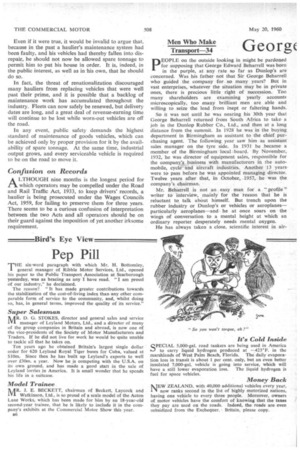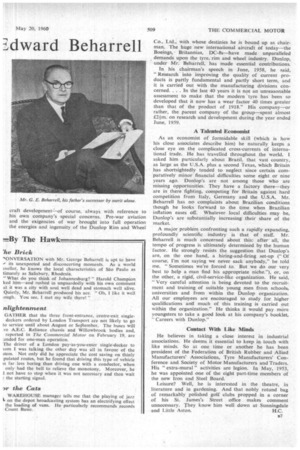Men Who Make Transport-34
Page 40

Page 41

If you've noticed an error in this article please click here to report it so we can fix it.
Georg(
7_Jdward Beharrell pEOPLE on the outside looking in might be pardoned for supposing that George Edward Beharrell was born in the purple, at any rate so 'far as Dunlop's are concerned. Was his father not that Sir George Beharrell who guided the company for. so many years? But in vast enterprises, whatever the situation may be in private ones, there is precious little right of succession. Too many shareholders are examining yearly accounts microscopically, too many brilliant men . are able and willing to seize the lead from inept or faltering hands.
So it was not until he was nearing his 30th year that George Beharrell returned from South Africa to take, a job in the Dunlop Rubber Co., Ltd., and then at a long distance from the summit. In 1928 he was in the buying department' in Birmingham as assistant to the chief. purchasing agent. The following year saw him as assistant sales manager on the tyre side. In -1931 he became a member of the Birmingham local board. By November, 1932, he was director of equipment sales, responsible for the company's . business with manufacturers in the automobile, cycle and aircraft industries. Another 13 years were to pass .before he was appointed Managing director. Twelve years after that, in October, 1957, he was the company's chairman.
Mr. Beharrell is not an. easy man for a "profile '?•writer to interview, Mainly for the reason that he is
reluctant to talk about himself. But trench upon the rubber industry or Dunlop's or vehicles or aeroplanes— particularly aeropIanes---and he at once soars on the wings of conversation to a mental height at which an ordinary reporter desperately needs mental oxygen.
He has always taken a close, scientific interest in air craft development----of course, always with reference to his own company's special concerns. Pre-war aviation and the exigencies of war brought into full operation the energies and ingenuity of the Dunlop Rim and Wheel Co., Ltd., with whose destinies he is bound up as chairman. The huge new international aircraft of today—the Boeings, Britannias, DC-8s—have made unparalleled demands upon the tyre, rim and wheel industry. Dunlop, under Mr. Beharrell, has made essential contributions.
In his chairman's speech in June, 1958, he said, "Research into improving the quality of current products is partly fundamental and partly short term, and it is carried out with the manufacturing divisions concerned. . . In the last 40 years it is not an unreasonable assessment to make that the modern tyre has been so developed that it now has a wear factor 40 times greater than that of the product of 1918." His company—or rather, the parent company of the group—spent almost £24-m. on research and development during the year ended June, 1959.
A Talented Economist As an economist of formidable skill (which is how his close associates describe him) he naturally keeps a close eye on the complicated cross-currents of international trade. He has travelled throughout the world. I asked him particularly about Brazil, that vast country, as large as the U.S.A. plus a second Texas, which Britain has shortsightedly tended to neglect since certain comparatively minor financial difficulties some eight or nine years ago. Dunlop's are not among those who are missing opportunities. They have a factory there—they are in there fighting, competing for Britain against hard competition from Italy, Germany and the U.S.A. Mr. Beharrell has no complaints about Brazilian conditions though he looks forward to the time when Brazilian inflation eases off. Whatever local difficulties may be, Dunlop's are substantially increasing their share of the market.
A major problem confronting such a rapidly expanding, profoundly scientific industry is that of staff. Mr. Beharrell is much concerned about this: after all, the tempo of progress is ultimately determined by the human factor. He strongly resists the suggestion that Dunlop's are, on the one hand, a hiring-and-firing set-up (" Of course, I'm not saying we never sack anybody," he told me. "Sometimes we're forced to, But we do our very best to help a man find his appropriate niche."), or, on the other, a rigid, civil-service-like organization. Be said, "Very careful attention is being devoted to the recruitment and training of suitable young men from schools, universities and from within the Dunlop organization. All our employees are encouraged to study for higher qualifications and much of this training is carried out within the organization." He thinks it would pay more youngsters to take a good look at his company's booklet, Careers with Dunlop."
Contact With Like Minds
He believes in taking a close interest in industrial associations. He deems it essential to keep in touch with like minds. So at one time or another he has been president of the Federation of British Rubber and Allied Manufacturers' Associations, Tyre Manufacturers' Conference and Society of Motor Manufacturers and Traders. His " extra-mural " activities are legion. In May, 1953, he was appointed one of the eight part-time members of the new Iron and Steel Board.
Leisure? Well, he is interested in the theatre, in literature and in gardening. And that nobly rotund bag of remarkably polished golf clubs propped in a corner of his St. James's Street office makes comment unnecessary. They know him well down at Sunningdale and Little Aston. H.C.




















































































































